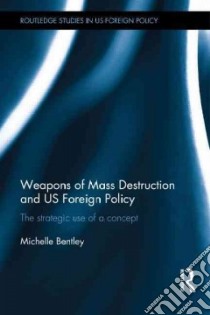Weapons of Mass Destruction and Us Foreign Policy - 9780415830188
Un libro in lingua di Michelle Bentley edito da Taylor & Francis, 2014
- € 127.60
- Il prezzo è variabile in funzione del cambio della valuta d’origine
This book is an innovative and path-breaking examination of the use of concepts – specifically ‘weapons of mass destruction’ (WMD) – in US foreign policy and national security discourse.
At the heart of the work is the claim that US actors re-define the WMD concept in order to manipulate security discourse. Far from the fixed and self-evident concept the current debate assumes WMD to represent, it is a flexible and dynamic construct whose (shifting) meaning is derived from the strategic and contextualized intention of political actors. WMD is a political tool, one whose value lies in the ability to reconstruct meaning according to the needs of the actors who use it. As such, understanding conceptual definition is a crucial issue that has important implications for understanding how actors develop security policy as well as the study of WMD more widely.
Current analysis of WMD definition has made headway into identifying the repercussions that the conceptual conflation of such diverse weapons – typically understood as a reference to nuclear, biological and chemical weapons – has for international security. While the concept assumes these weapons are ‘equal’, the vast disparity between them, and their disparity from the conventional weapons from which they are supposedly distinct, means this approach is seen as unreflective of reality, causing miscalculations in security policy. Not least, this has highlighted that the issue of WMD definition is a priority concern where this has direct implications for strategy. Yet this book establishes that the assumptions underpinning this debate are fundamentally flawed. These discussions rest on a static understanding of the concept. Meaning is treated as unchanging; definition is assumed to be the same in all cases. In directly disputing this core assumption, however, this book draws on a range of previously unanalysed data dating from the concept’s emergence in 1945 to document that a wide variety of definitions have been applied to WMD. In doing so, it directly challenges current perceptions of conceptual meaning and the arguments derived from these. Ultimately, this book’s main objective is to show that discussing WMD within the context of a fixed meaning is mistaken and skews analysis of security and military policy.
This book will be of much interest to students of Weapons of Mass Destruction, US Foreign and Security Policy, Strategic Studies and IR.
Informazioni bibliografiche
- Titolo del Libro in lingua: Weapons of Mass Destruction and Us Foreign Policy
- Sottotitolo: The Strategic Use of a Concept
- Lingua: English
- Autore: Michelle Bentley
- Editore: Taylor & Francis
- Collana: Taylor & Francis (Hardcover)
- Data di Pubblicazione: 13 Marzo '14
- Genere: POLITICAL SCIENCE
- Pagine: 178
- EAN-13: 9780415830188


